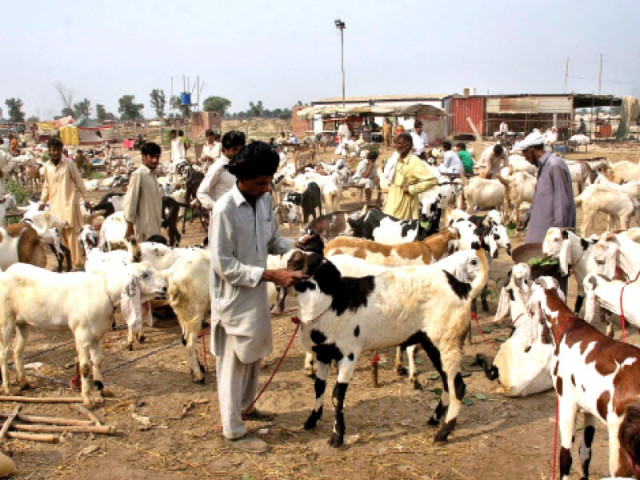Animal markets: Sales slow as animal prices up 30 per cent
Traders complain of increasing transport, feed costs, lack of facilities at markets.

Animal markets: Sales slow as animal prices up 30 per cent
Sales of sacrificial animals here have been slow with traders charging some 30 per cent more than last year due to higher feed and fuel costs.
Animal markets have been set up at Shahpur Kanjaran on Multan Road, on the Sheikhupura side of Saggian Pul, at Batapur in Harbanspura, at B Block China Scheme in Baghbanpura, Glass Mari Zarrar Shaheed Road and at LDA Avenue on Raiwind Road. The latter is the biggest market.
Customers at the markets balked at the high prices. Many said they would be contributing money for a joint sacrifice rather than buying a whole animal, while some said that they would buy an animal a day or two after Eid when prices come down. Meanwhile, the traders complained about high transport costs and a lack of facilities at the markets.
Traders at the LDA Avenue market were mostly selling goats, cows and camels. Sheep, including dumba (fat-tailed sheep) were low in numbers. Traders said that sheep were generally preferred in Khyber Pakhtunkhwa, while goats sold better in the Punjab.
Many sheep were being sold at the small market at Saggian Pul, which is located practically on the road and is a massive hindrance to traffic.
“There are not many serious buyers around yet,” said Muhammad Ali, a trader at Saggian. He said that last year he was selling goats for Rs20,000-30,000. This year he is asking for at least Rs40,000. “I had to pay Rs3,000 more than last year for a truck from Gujrat. Also, the cost of rearing animals has doubled,” he said.
Ali said that goats were selling at an average of about Rs30,000. He said that as it got closer to Eid, the price of good animals would rise while other rates would fall.
Dost Muhammad, a trader at LDA Avenue, said that he had arrived five days ago and was yet to sell a single one of his dozen cows. He said he was asking for Rs65,000 to Rs150,000 for his animals.
Ali Akbar from Pakpattan said that last year he had sold cows for Rs80,000-100,000 while this year he was demanding up to Rs160,000. He said that last year he had paid Rs25,000 for freight; this year he had paid Rs36,000.
Muhammad Esa from Vehari said that he was selling camels at almost the same price as last year, for between Rs125,000 and Rs170,000. Like other traders at LDA Avenue, he said that there was no water for the animals to drink and no electricity at the market.
Sheep including dumbas were being sold for around Rs10,000 less than goats of the same weight.
Zawar Khan, a dumba trader, said that he had paid Rs7,000 to transport his animals from Gujrat while he had paid Rs5,000 last year. He said that most dumbas were taken to Kyber Pakhtunkhwa where people preferred meat from sheep over goats. He said that he was seeking Rs25,000-35,000 for a dumba with more than 35kg of meat.
Haider Ali, a businessman from Johar Town, was on Saturday trying to buy three goats. After a look at the prices, he said he had decided to buy one cow instead, as it worked out at around the same price. “Prices have gone up considerably from last year,” he said.
Aurangzeb Khan, a PTCL employee from Iqbal Town, said that he was stunned at the high prices. “A goat cost as much as a second-hand 70cc motorcycle. I saved Rs20,000 to buy a goat this year but I can’t afford it,” he said. He added that as in previous years, he would pool in with others for a joint sacrifice arranged by his local mosque.
Published in The Express Tribune, October 21st, 2012.



















COMMENTS
Comments are moderated and generally will be posted if they are on-topic and not abusive.
For more information, please see our Comments FAQ